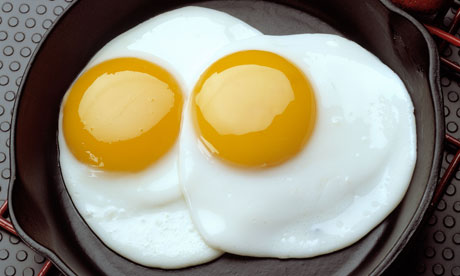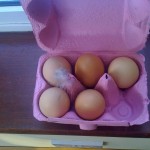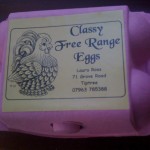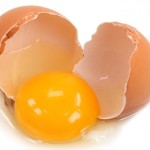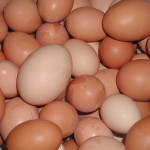I buy my eggs from a lady a few doors up the road. They are lovely! So fresh that the whites hold together beautifully when cooked, yolks the iridescent shade of yellow you only get from truly free range eggs. They cost £1 for half a dozen and were laid the same morning.
In the village, I can buy eggs from Tesco, which are English but from where in England it does not say. They claim to be free range, but that is in accordance with the legal definition of the term, which does NOT mean the chickens are free to scratch around anywhere they like 24 x 7, but does distinguish them from cheap and not-so-cheerful eggs produced under vicious battery cage conditions. They are stamped to provide information to meet the requirements of the law, thus:
Where marking (stamping) of eggs is required, this may be done by either the producer prior to dispatch, or by the first packing centre which is obliged to grade, mark, pack and label all eggs. Eggs must be marked with the producer code (issued to producers upon registration) when they are:-
- Sold as Class A
- Sold as Class B (unless specific exemptions apply*)
- When eggs are transported across EU Member State’s borders (unless exemptions apply*)
- Sold at a local public market (unless the producer has 50 hens or less)
Marking may be done using direct stamping or other printing equipment, using food-grade ink and hygienic
The producer code e.g. 3UK99999 is made up of:-
A single number suffix giving the method of production (0 = Organic, 1 = Free Range, 2 = Barn, 3 = Eggs from Cages Hens), then two letters (the ISO code) giving the country of production and then series of numbers sometimes with letter which indicate the specific farm where the eggs produced. These codes are unique within the EU to each farm, not transferable and are issued only upon full registration.
Got that? In other words, the consumer still has no way of knowing directly where the eggs originated from, nor when they were laid. Oh, but “at Tesco, quality and freshness has always meant hand-picked groceries, carefully packed – just as you’d do it yourself. But it also means better ingredients and the longest shelf lives possible.” Half a dozen medium free range eggs cost £1.48, by the way.
I’d sooner buy minus stamp but direct from source, as fresh as it gets. Not everyone has flocks of chickens kept up their road, but it would be a mistake to think you couldn’t buy better, fresher and cheaper than a supermarket. Look around your local area and you will find eggs that are cheaper, fresher and better than the supermarket.
Why would anyone choose to buy any different, but for the fact that we’ve been brainwashed by supermarkets to buy their products? You pay a high price for convenience!
By the way, I hear that supermarkets now have their suppliers inject hens with some substance to make the yolks more yellow, in order to mimic the natural effect of top quality eggs. Don’t be fooled – use your local supplier every time and get the real think!
This is the first in a series. Watch out for more…

